
Trevor "Grey Wolf" Frederick at a Local Tournament that utilized trophies & medals while holding a sword he had won at a previous tournament last year.
In an art revolving around self-reflection and a personal journey, Martial Arts Tournaments can be an excellent way to showcase your skills and measure your abilities against others on a similar path. For many, competition is an exceptional tool to bring out of the most skillful performances. When all's said and done, how do tournaments reward the efforts of participants? As a competitor for the last 20 years myself, I’d like to explore all of the awards that I have seen used at tournaments and discuss the pros and cons of each to see just what awards are best for Martial Arts Tournaments.
Trophies Pros:
Every kid wants a trophy! It is a grand achievement that they can brag about and show off. Yes, as martial artists we are supposed to be humble and teach those qualities to our young students. But we also want those same students to be proud of their achievements and the trophy allows them to do that.
There are so many different ways that you can build trophies: tall, short, wide, gold, silver, red, yellow or blue. One could write a Dr. Seuss book with all of the options available. And you can customize them with your school or company logo on them, either written on the plaque or in full color as one of the figurines. It is easy to build trophies and save ones that you don’t use year after year. You do not even need to put a plaque on the trophies. However, plaques do make the trophy that much more meaningful as they describe exactly what it is that a competitor has earned.
Trophies Cons:
Trophies are highly customizable but primarily are built out of granite and plastic. There are only so many different figures that you can choose from in the martial arts world to put on the top of a trophy. Typical toppers are of someone wearing a gi and throwing a sidekick. Also there is a lack of consistency in sizes from tournaments. At one tournament a 1stplace trophy can range from 6 feet to 12 inches. While a 2ndor 3rdplace trophy can also be in the same size range. So without a plaque it can be hard to distinguish what someone has won.
Sizes can also confuse young students. For example, lets say that one time they won a big trophy for 3rdplace but then at another tournament they won 1stplace and only got a small trophy. The accomplishment should be enough, and size shouldn’t matter, but to some (dare I say most) it does.

4 Inch Trophy
Trophydepot.com
Trophies Price Point: $3 - $75 Average
It is all about how customized you want to go; the main cost being how tall you would like the trophies to be. Most trophies have a granite-like base with plastic columns and plastic figures on top kicking or punching. You can put a logo on a circular figure as well. The most important part to me is the custom plaque that tells people what the trophies stands for. Sitting at my studio are trophies won over the years by my students and myself. Some 2ndplace trophies are bigger than the Grand Championship trophies – which is why plaques matter so much. A trophy without a plaque is fairly meaningless. On the smaller side, a 4-inch trophy would cost around $3 while a 6-foot trophy could cost upwards of $75.
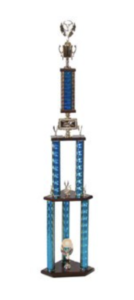
6 Foot Trophy
TrophyOutlet.com
Medals Pros:
Gold, silver and bronze are universally known rankings that make it easy to see how well a competitor did. We can thank the Olympics for that. Medals are easy to display with a hook on the wall and do not take up a lot of space whether you decide to display or store them away.
For Tournament Hosts, medals are also highly customizable which is important for branding. You can have the school or organization logo that is hosting the tournament on all of your medals or even have the medal in the shape of your logo.
Medals Cons:
The biggest thing going against medals are that they’re not big and showy like a trophy. Most kids and young Competitors would prefer to have a trophy instead of a medal and I have seen many events use medals as consolation prizes. You get one just for signing up which lessens the value of winning a medal at another tournament. Think about any of the obstacle course races that have grown in popularity. At the end of the race everyone gets a metal no matter how well they did. I believe that yes, finishing one of those races is an accomplishment in and of itself, but has it lessened the value of medals at other events?
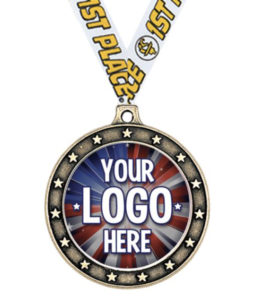
3 Inch Medal
CrownAwards.com
Medals Price Point: $3 - $12 + set-up fees ($70-$300) Average
Going custom, there are a few factors that you need to take into consideration. First off, how customized to you want to go. You can get your logo imprinted on with no added color. You can go full color. The medals could be 2 inches, 3 inches, 4, 5, even 6 inches. You can even create a 3D image that is sticking out of the medal. The more you do the more expensive that it will cost you. The biggest cost to factor in is the set-up costs. Each side of the medal needs to have a die created for it and that is a one time but often costly fee. On Average, medals themselves cost between $3 & $12, but come with upwards of $70 to $300 set-up fees.
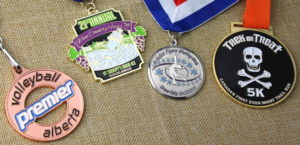
Fully Customizable Options
GS-JJ.com
Weapons Pros:
Weapons are cool and can be potentially expensive to purchase as someone training in the martial arts field. So winning them at a tournament can help take that burden away from you. You pay for the experience and if you do well you get a new weapon to learn how to use. Also if you happen to be a martial arts supplier hosting the tournament, it is a great way to get your product in the hands of people that are going to use them and recommend them to other people. I posted my “weapon trophies” from a tournament and a fellow training partner commented how much she liked one of the Chinese fans I won and that I should send it to her. This means for Christmas I’m going to end up buying another one of those fans to send her as a gift. It was a great way of branding for that company.
Weapons Cons:
The last tournament I went to I left with a katana for a 1st place victory, a Chinese fan for a second place victory, and three wushu swords for 2 first place and 1 second place prize. The downside of using weapons as trophies is that I as an individual have no need for three of the same weapon. Three separate medals or trophies, however, would be easier to display and have a little bit more meaning to them to the general public. Also the lack of consistency with weapons given out as prizes was a little awkward. For example: a competitor for fourth place in two separate divisions won sais, which are more expensive and have a higher perceived value then a Chinese fan would as the second place prize. So if you choose to go this route please stay consistent.
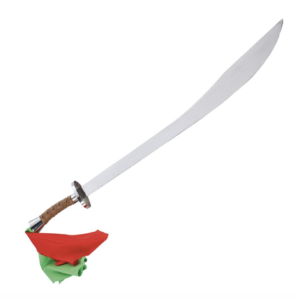
Chinese Broadsword
CenturyMartialArts.com
Weapons Price Points: $25 - $45 “Wholesale Price”
Now, since I am not a martial arts supply company, I can only make the case for how much weapons would cost (at best) at wholesale prices. The best weapon that a tournament can give would arguably be a sword. Chinese broadswords cost at wholesale $30, where a double edged Samurai sword would cost you $60. Those numbers do go down if you happen to be a supply company. However, for a typical tournament host, weapons as prizes are probably out of the budget for your tournament.
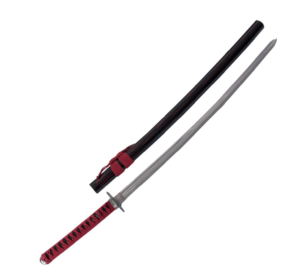
Double Edged Samurai Sword
CenturyMartialArts.com
Certificate Pros:
They are paper and the cheapest option. Especially if you’re hosting a small a tournament, it might not be a bad idea. Paper is fully customizable, as you can design whatever you want on the computer and then send it to a printer and put on nice paper. You’re looking at maybe $.50 per award. Yes, price point has its own section but this is the biggest pro to using certificates. I personally like the idea of certificates given out to every competitor saying that they did compete and represent themselves well instead of giving out medals or other types of awards to competitors that don’t place in the top three or five.
Certificate Cons:
You get what you pay for. I believe most people would see that a certificate is the cheap way out of awards and could lessen the importance of your tournament. Paper awards could give the impression that your tournament is not worth the time, money and energy that competitors and their families put into attending or supporting. True, we should go to compete, showcase our skills and learn about ourselves and what we can do, however, people also want to win and be recognized for that. If competitors are spending between $50-$100 to compete at your tournament is it worth spending a couple of extra dollars on a more substantial award?
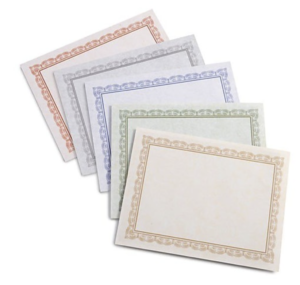
Gartner Studios Certificate
Staples.com
Certificate Price Points:
In an attempt to go “all out” on paper certificates; quoting from Staples.com for a $100- pack of Professional Certificates, they cost $5.99 for 100 before printing. And then for a quality Certificate Holder, those come in packs of 50 for $76.99. Bringing the total per award to a whopping $1.60. So for less than $2 you can have extremely nice & professional paper awards made up for a tournament. It is the cheapest route by far – but because of that, the tournament host may come off as cheap and all about the money. If you go with a paper option, my personal opinion is to make them as nice as possible.
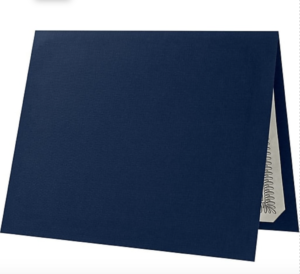
LUX Certificate Holders
Staples.com
Conclusion & Thoughts:
My goal with this blog is to take a good look at why tournaments utilize different types of awards. At the end of the day, these are my thoughts based on my experiences. I welcome any feedback and discussion on this subject. What are your thoughts? Did I forget anything? What about championship belts or plaques? What would you want to win? What would your students like to win? And most importantly: why does all this matter?
Respectfully Submitted, Tiger Blood
